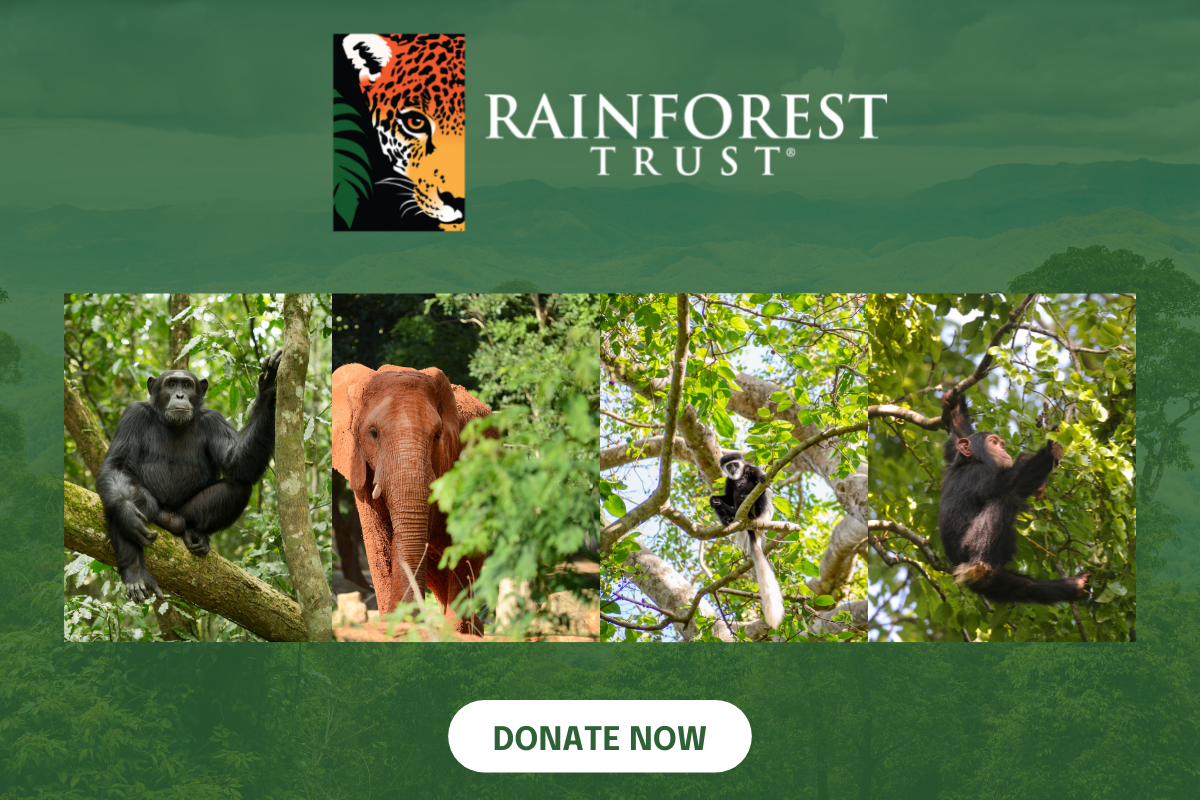Protecting 2,300 Acres Of Cameroon’s Atlantic Rainforest
Through our partnership with Rainforest Trust UK we have helped protect 2,300 Acres of vital Atlantic Rainforest. Helping to increase the protection of The Douala-Edea Wildlife Reserve, which has been identified as one of the most important conservation landscapes in Central Africa.

Published
Cameroon’s Atlantic Rainforest Project
Our 2017 donation to Rainforest Trust UK helped us protect 2,300 acres of Atlantic forest in Cameroon. The Douala-Edea Wildlife Reserve was recently identified as one of the most important conservation landscapes in Central Africa. Rainforest Trust is working to increase the reserve’s protection level by making it into a national park. Not only that but it will expand its range to include 98,000 acres of mangroves, rivers and wetlands as well as 247 acres of marine habitat. The area the trust is working on will help to protect Chimpanzees, Gabon Black Colobus Monkeys, African Forest Elephants as well as Manatees, Humpback Dolphins and 3 species of turtle.

The Importance of the Atlantic Rainforest
The Atlantic Rainforest is home to several threatened primates including the Central Chimpanzee and Gabon Black Colobus Monkey, while also serving as a refuge for a small population of African Forest Elephants. The reserve’s labyrinth wetlands and marine habitats are a haven for birdlife and threatened marine species such as the West African Manatee and Atlantic Humpback Dolphin. Furthermore, the Green and Olive Ridley Sea Turtles all nest on the reserve’s beaches and the Critically Endangered Hawksbill Sea Turtle occur offshore.
Despite this area’s high biodiversity value, much of it still remains unprotected and threatened by growing resource pressure from neighbouring towns. Rainforest Trust is working with local partner Cameroon Wildlife Conservation Society (CWCS) to elevate the protected status and expand the reserve to 741,000 acres, protecting both the integrity and connectivity of this amazingly diverse ecosystem.

Habitat Degradation
Habitat degradation is the biggest threat to this important African forest, largely driven by the rapid urbanisation of surrounding area. Urbanisation has brought more and more people easier and easier access to the forest. With better access via rivers and newly constructed roads it has become easier to exploit its natural resources at an unsustainable rate. Poaching, fishing, agriculture and petroleum exploration have all contributed to the degradation of the natural ecosystem on Cameroons Atlantic coast.

The Douala-Edea Reserve Community
There are over 10,000 people living in and around the current Douala-Edea Reserve. The majority of these people are subsistence fisherman and come from 1 of 40 villages in the area which are predominantly part of the Bakoko, Pongo and Malimba Tribes. The recent upturn in economic opportunities has attracted immigrants to the area from neighbouring African countries such as Nigeria and Ghana. As of 2003 a local partner of the Rainforest Trust has been working with the local communities on livelihood and management projects to help establish and protect the reserve.

The Project
Rainforest Trust is working with local partner, Cameroon Wildlife Conservation Society (CWCS), to elevate the protected status of Douala-Edea Wildlife Reserve to a national park while increasing the reserve by 345,800 acres of mangrove forests, rivers, wetlands and marine habitats. Collectively, this expansion and conversion to a national park will actively safeguard a total of 741,000 acres. To ensure the national park remains protected, the project also focuses on strengthening monitoring and enforcement of the reserve, whilst engaging local communities in the establishment of the national park. With extra funding new rangers will be able to be hired and trained and new ranger stations will be constructed at strategic locations. With more rangers and stations larger areas will be able to be patrolled on a daily basis making it easier to deter illegal loggers and poachers.
By involving the local communities in the development of the National Park it will help to create an alternative income based on the natural surroundings that is none damaging. Not only that but it will bring local knowledge to the establishment of the reserve which can often be a forgotten but important resource.

Ways you can help
A few simple ways you can help support Rainforest Trusts Conservation projects:
- Trying to only purchase products made form recycled wood. To reduce the need of logging.
- Avoid Chinese medicines that include pangolin scales.
- Support Companies who partner with Rainforest Trust
- Donate to Rainforest Trust UK
Learn more about the projects we have supported here. To learn more about our commitment to sustainability please click here.







